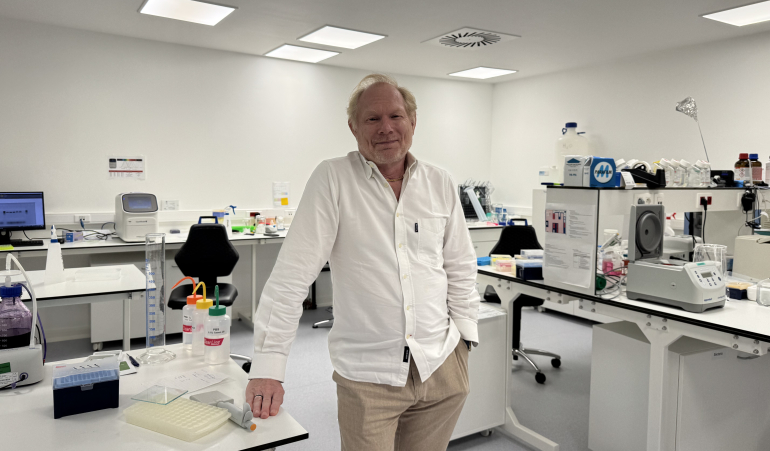
Based in Liège, the company Bio-Sourcing has developed a platform that makes it possible to produce medicines from goat milk. This approach allows the company to scale up production and reduce the manufacturing costs of biopharmaceuticals, which can be used, among other things, to treat cancer. Still in development, Bio-Sourcing is seeking new investors.
The Walloon company Bio-Sourcing has introduced an innovation that enables the production of cancer drugs from goat milk. Based in Liège, this biotechnology firm employs about thirty scientists. Founded in 2014, Bio-Sourcing is a spin-off of GTC in Boston, itself a subsidiary of the French group LFB Biotechnologies, a pharmaceutical laboratory specialized in the production of blood-derived proteins.
Recognizing the high costs of monoclonal antibody production, Bertrand Mérot launched Bio-Sourcing. Initially, the company held an exclusive license in the field of animal health. However, given its promising results and improvements, Bio-Sourcing can now extend its technology to human health.
“Currently, the production of therapeutic proteins—so-called biopharmaceuticals—involves very large and complex proteins that require living systems to be manufactured. Today, they are mainly produced by mammalian cell cultures in huge stainless-steel bioreactors. These require massive investments, often amounting to several hundred million dollars, just to produce a few hundred kilos of monoclonal antibodies. As a result, there are major global accessibility issues: these antibodies are restricted to treating certain diseases like cancer and neurodegenerative conditions, and mostly to countries that can afford treatments costing hundreds of thousands of euros. Production is also energy-intensive, electricity-hungry, and generates significant CO₂ emissions. A paradigm shift in bioproduction was necessary, as the current technology had reached its limits,” explains Bertrand Mérot, founder and CEO of Bio-Sourcing.
Using goat milk
“For us, the paradigm shift was to use what nature has given us as the best bioreactor: the mammary gland of a dairy species. We employ cutting-edge molecular biology tools, including genome editing (such as CRISPR-Cas9), to introduce a human gene into a goat’s genome so that the human protein is produced exclusively in the goat’s milk,” says Mérot.
This is possible because the genetic code is universal and thus shared between goats and humans. “It means we share the same reading system,” he notes. The method has no impact on the goat’s health, as the protein is expressed only in its milk.
“After that, the protein is purified from the milk to make it into medicine. In doing so, we replace investments of several hundred million dollars with a simple goat farm of a few hundred animals. Instead of $300 million, we’re talking about $15–20 million in investments. Operating costs are also reduced,” Mérot adds. With this method, it becomes possible to set up local production in less-advantaged regions, such as Africa.
Bio-Sourcing is already establishing a partnership in South Africa to develop a pharmaceutical-grade goat herd.
“We didn’t invent the concept of this technology platform, but we industrialized it. Our main contribution is to have transformed a laboratory-based technology—which 20 years ago could occasionally, by chance, produce a medicine—into a new industrial and pharmaceutical technology platform. This could provide Europe with a solution to reduce therapy costs and gain pharmaceutical sovereignty. It also offers hope for better access to innovative therapies in the Global South, particularly in anti-infective treatments,” Mérot emphasizes while showing us around the company’s labs on the University of Liège campus.
“At first, we decided to focus on biosimilars—biotherapeutics that already exist, that have proven to be highly effective, but that are inaccessible to 98% of the population because they are produced in limited quantities and cost too much. We chose these biosimilars to demonstrate that our platform can match the quality of proteins already available on the market,” he continues.
Support from BioWin
In its development, Bio-Sourcing has received support from the competitiveness cluster BioWin. “It was through BioWin’s BeForOneWorld program that we launched all of our biosimilar production activities,” notes Mérot. The company has also benefited from funding from the Walloon Region’s “DGO6” and the European Innovation Council.
The BeForOneWorld program and subsidies are soon coming to an end. To continue developing Bio-Sourcing, Mérot is now increasing the company’s capital and calling for new investors. “This is a remarkable project born in Wallonia that can truly provide global-scale solutions for medicine production. It also bridges traditional farming with the creation of high-value molecules. We are fully aligned with the energy and ecological transition. Moreover, new opportunities may open up for alternative delivery methods, such as oral administration. The potential is enormous—it’s a true national and European cause for global health. It deserves collective belief and investment,” Bertrand Mérot concludes.
Isabelle Anneet (AWEX)